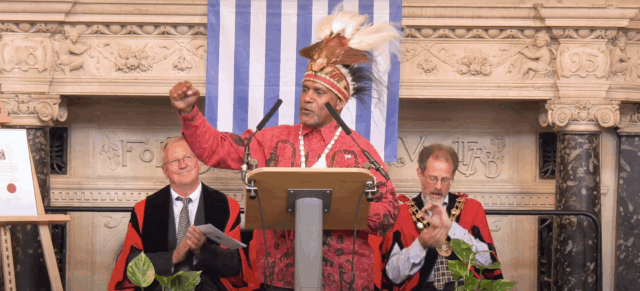
Benny Wenda: Papuan Independence Leader Struggles for International Support
By:

Executive Summary:
- Based in Oxford since receiving asylum in 2002, Wenda remains the most visible leader of the United Liberation Movement for West Papua (ULMWP), though the movement itself faces deep internal divisions.
- Indonesia has sought to tie Wenda to violence and placed him on an Interpol Red Notice, but he denies involvement. He continues to highlight the 1969 “Act of Free Choice” as illegitimate and campaigns internationally for a new referendum, while warning of genocide, deforestation, and demographic change in Papua.
- Despite honors abroad and a large independence petition, Wenda’s campaign garners little international attention compared to other global conflicts. His leadership is also questioned by some Papuan factions, limiting both internal cohesion and external support for independence.
Benny Wenda is a West Papuan activist and independence leader, and the most recognizable face of the United Liberation Movement for West Papua (ULMWP). The ULMWP was formed in 2014 from a coalition of pro-independence factions active in Indonesia’s territory in western New Guinea, with the purpose of uniting the Papuan independence movement’s disparate factions’ political and military wings (ABC News [Australia], July 3, 2019). Although the group has seen significant internal division since its formation, Benny Wenda remains its best-known leader and main figurehead.
Indonesian authorities have attempted to implicate Wenda in violence in spite of his mainly political role. Indigenous Papuans are black Melanesians, physically distinctive from other Indonesians. In 2019, a series of escalations—students supportive of Papuan independence were believed to have damaged an Indonesian flag, allegedly leading to nationalist groups surrounding the building they were in and hurling racial slurs at them—provoked anti-racism riots that killed 17 students and one police officer (BBC, August 22, 2019; Al Jazeera, August 28, 2019). The Indonesian National Police’s spokesman accused Wenda of proliferating “fake news,” claiming that the Papuan leader fabricated and disseminated the story of the Papuan students’ harassment that provoked the unrest in the first place (ANTARA News, September 24, 2019).
In 2011, the Indonesian police placed a red notice on Wenda with INTERPOL. The charges related to Wenda’s alleged involvement in attacking the Abepura Police Station in 2000, in which six police officers and civilians were killed (BBC, November 25, 2011). Wenda, who denies the allegations, claims he was in the United Kingdom at that time, studying at Oxford; he was granted asylum in 2002. While based in Oxford, Wenda has derided the 1969 “Act of Free Choice” referendum that Indonesia used to legitimize its sovereignty over Papua as an “act of no choice.” He argues that the Indonesian military hand-picked the 1,026 voters in the plebiscite’s voting pool, who were also “surveyed under duress.” Wenda alleges that these factors led the voters to unanimously vote for Indonesian annexation, rather than a genuine desire to join Indonesia (New Naratif, May 19). Since 1969, the majority of the international community has recognized Papua as part of Indonesia, despite Wenda and his followers’ claims that an independent West Papua should have succeeded the departure of Dutch colonialists in 1969.
In Oxford, Wenda received the honorary Freedom of the City award in 2019 (YouTube/Oxford City Council, July 17, 2019). In traditional Papuan attire, he presented a petition he provided to the Chairperson of the Human Rights Council of the United Nations to hold another Papuan independence referendum that gained 1.8 million signatures, some 72 percent of the territory’s overall population (Free West Papua Campaign, January 29, 2019).
Perhaps the greatest challenge Wenda faces is the obscurity and perceived irrelevance of the Papuan cause to the international community. While Wenda has warned of a “genocide” in Papua for years and some international observers support this claim, West Papua receives virtually no international coverage. Wenda addressed this disparity in a statement, decrying the Indonesian government for “claiming to oppose genocide in Gaza while committing their own genocide in West Papua” (Indigenous Peoples’ Major Group for Sustainable Development, accessed September 8; United Liberation Movement for West Papua, November 17, 2023).
Wenda also warns that Indonesia’s current President Prabowo’s visits to Papua have coincided with projects aimed at the exploitation of the region’s resources. These include deforestation projects and a new transmigration plan of non-indigenous Papuans to Papua (Roya News, March 11). Despite his ardent advocacy for independence, other Papuan independence leaders question the legitimacy of Wenda’s initiatives, such as his forming an “interim government” in 2020 (Jubi Papua, November 30, 2023). Wenda’s attempts to raise Papuan issues to global attention have included allegations that Indonesian forces used chemical weapons against Papuans in 2021 (Asia Pacific Report, January 31). Still, the lack of internal and external support remains a challenge Wenda must overcome for any future efforts toward West Papuan independence to succeed.



